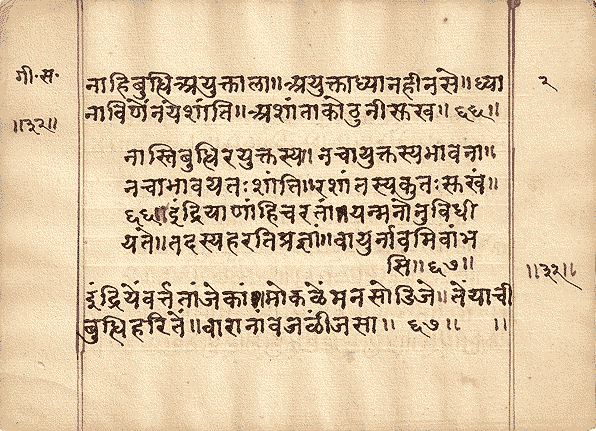BhG 2.66

nāsti buddhir ayuktasya na cāyuktasya bhāvanā
na cābhāvayataḥ śāntir aśāntasya kutaḥ sukham
To play the media you will need to either update your browser to a recent version or update your Flash plugin.
syntax
ayuktasya (of one who is not yoked) buddhiḥ (intelligence) na asti (there is not),
ayuktasya ca (and of one who is not yoked) bhāvanā (concentration) na [asti] (there is not),
abhāvayataḥ ca (and of one who is not concentrating) śāntiḥ (peace) na [asti] (there is not),
aśāntasya (of one without peace) sukhaṁ (happiness) kutaḥ (from where, how?)
grammar
| na | – | av. – not; |
| asti | – | √as (to be) Praes. P 1v.1 – it is; |
| buddhiḥ | – | buddhi 1n.1 f. – intelligence, thought, understanding, knowledge, idea, opinion (from: √budh – to wake, to perceive, to understand); |
| ayuktasya | – | a-yukta (√yuj – to yoke, to join, to engage) PP 6n.1 m. – not yoked, not endowed with, not suited; |
| na | – | av. – not; |
| ca | – | av. – and; |
| ayuktasya | – | a-yukta (√yuj – to yoke, to join, to engage) PP 6n.1 m. – not yoked, not endowed with, not suited; |
| bhāvanā | – | bhāvanā 1n.1 f. – forming in the mind, conception, imgination, meditation, concentration (from: √bhū – to be, bhāva – state, existence, nature, emotions); |
| na | – | av. – not; |
| ca | – | av. – and; |
| abhāvayataḥ | – | a-bhāvayant (√bhū – to be) PPr 6n.1 m. – of one who is not imagining, not meditating, not concentrating; |
| śāntiḥ | – | śānti 1n.1 f. – tranquility, peace, satisfaction, end, death (from: √śam – to calm, to put to an end, to destroy); |
| aśāntasya | – | a-śānta 6n.1 m. – of one without peace (from: √śam – to calm, to put to an end, to destroy, PP śānta – calm, tranquil); |
| kutaḥ | – | av. – from where, how? (from: kim – what? indeclinable ablative with an ending: -tas); |
| sukham | – | sukha 2n.1 n. – pleasure, comfort (from: su – prefix: good, excellent, beautiful, virtuous; kha – cavity, hole, nave; su-kha –joy, happiness, literally: good hole in the nave [of a wheel through which an axis runs] that makes the moving smooth; or from: su-√sthā; opposite to: duḥkha – pain, difficulty); |
Śāṃkara
The key:
an excerpt from the commented verse
quotes from the scriptures
starting polemic
|
Tranquility is thus extolled: |
seyaṃ prasannatā stūyate – | |
| There is no wisdom to the unsteady, and no meditation to the unsteady, and to the unmeditative no peace; to the peaceless, how can there be happiness? |
nāsti buddhir ayuktasya na cāyuktasya bhāvanā | na cābhāvayataḥ śāntir aśāntasya kutaḥ sukham ||2.66|| |
|
|
To the unsteady (ayukta = asamahita), to the man who cannot fix the mind in contemplation, there can be no wisdom (buddhi), no knowledge of the true nature of the Self. To the unsteady, there can be no meditation, no intense devotion to Self-knowledge. |
nāsti na vidyate na bhavatīty arthaḥ, buddhiḥ ātma-svarūpa-viṣayā ayuktasya asamāhitāntaḥ-karaṇasya | na ca asti ayuktasya bhāvanā ātma-jñānābhiniveśaḥ | | |
|
So, to him who is not devoted to Self-knowledge there can be no peace, no tranquility. |
tathā na cāsty abhāvayata ātma-jñānābhiniveśam akurvataḥ śāntir upaśamaḥ | | |
|
To the peaceless man, how can there be happiness? Verily, happiness consists in the freedom of the senses from thirst for sensual enjoyment, not in the thirst (tṛṣṇa) for objects. This last is mere misery indeed. |
aśāntasya kutaḥ sukhaṃ? indriyāṇāṃ hi viṣaya-sevā-tṛṣṇātaḥ nivṛttir yā tat-sukham, na viṣaya-viṣayā tṛṣṇā | duḥkham eva hi sā | | |
|
While there is thirst, there can be no trace of happiness; we cannot so much as smell it. |
na tṛṣṇāyāṃ satyāṃ sukhasya gandha-mātram apy upapadyate ity arthaḥ ||2.66|| |
Rāmānuja
mayi saṃnyasta-mano-rahitasya sva-yatnena indriya-damane pravṛttasya kadācid api viviktātma-viṣayā buddhir na setsyati | ataeva tasya tad-bhāvanā ca na saṃbhavati | viviktātmānam abhāvayato viṣaya-spṛhā-śāntir na bhavati | aśāntasya viṣaya-spṛhā-yuktasya kuto nitya-niratiśaya-sukha-prāptiḥ
Śrīdhara
indriya-nigrahasya sthita-prajñatā-sādhanatvaṃ vyatireka-mukhenopapādayati nāstīti | ayuktasya avaśī-kṛtendriyasya nāsti buddhiḥ | śāstrācāryopadeśābhyām ātma-viṣayā buddhiḥ prajñaiva notpadyate | kutas tasyāḥ pratiṣṭhā-vārtā | kuta ity atrāha na ceti | na cāyuktasya bhāvanā dhyānam | bhāvanayā hi buddher ātmani pratiṣṭhā bhavati, sā ca ayuktasya yato nāsti | na cābhāvayataḥ ātma-dhyānam akurvataḥ śāntiḥ ātmani cittoparamaḥ | aśāntasya kutaḥ sukham mokṣānanda ity arthaḥ
Madhusūdana
imam evārthaṃ vyatireka-mukhena draḍhayati nāstīti | ayuktasyājita-cittasya buddhir ātma-viṣayā śravaṇa-mananākhya-vedānta-vicāra-janyā nāsti notpadyate | tad-buddhy-abhāve na cāyuktasya bhāvanā nididhyāsanātmikā vijātīya-pratyayānantaritasajātīya-pratyaya-pravāha-rūpā | sarvatra naño ‚stīty anenānvayaḥ | na cābhāvayata ātmānaṃ śāntiḥ sakāryāvidyā-nivṛtti-rūpā vedānta-vākya-janyā brahmātmaikya-sākṣāt-kṛtiḥ | aśāntasyātma-sākṣātkāra-śūnyasya kutaḥ sukhaṃ mokṣānanda ity arthaḥ
Viśvanātha
uktam arthaṃ vyatireka-mukhena draḍhayati nāstīti | ayuktasyāvaśīkṛta-manaso buddhir ātma-viṣayiṇī prajñā nāsti | ayuktasya tādṛśa-prajñā-rahitasya bhāvanā parameśvara-dhyānaṃ ca | abhāvayato ‚kṛta-dhyānasya śāntir viṣayoparamo nāsti | aśāntasya sukham ātmānandaḥ
Baladeva
pūrvoktam arthaṃ vyatireka-mukhenāha ayuktasyāyogino mad-aniveśita-manaso buddhir ukta-lakṣaṇā nāsti na bhavati | ataeva tasya bhāvanā tādṛg-ātma-cintāpi nāsti | tādṛśam ātmānam abhāvayataḥ śāntir viṣaya-tṛṣṇā-nivṛttir nāsti | aśāntasya tat-tṛṣṇākulasya sukham sva-prakāśānandātmānubhava-lakṣaṇaṃ kutaḥ syāt
- Copyright © 2010-2013 Quo Vadis Vision. Wszelkie prawa zastrzeżone.
- |
- About the project
- Appendices
- Audio
- Forum
- Contact
